Our 100 Days Plan
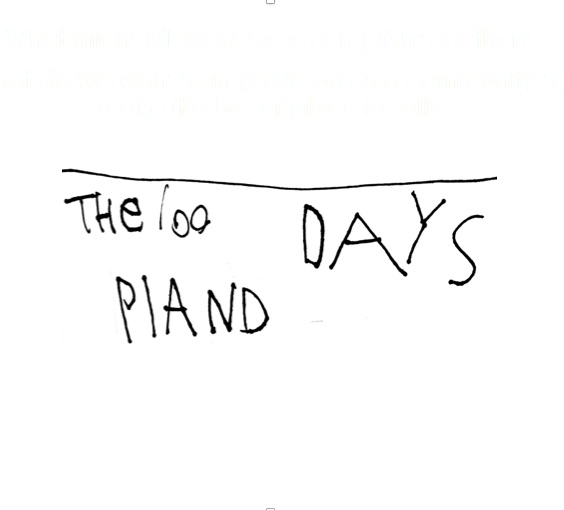
With January’s fickle weather, it felt like we were never going to settle back into our regular school and home routines. After the winter break, in the spattered days we attended school, I could see the children trying to reconnect to established friendships, trying to rekindle the bridges they had been growing in their new relationships – but I also felt some tension. I imagined it was due not only to the erratic-ness of the calendar, but also due to the political climate that was brewing in all of our lives.
The presidential inauguration was fast approaching. I considered how the media’s reactions to Trump and his nominees were filtering into the classroom. I wondered how the discussions, concerns, and opinions overheard or discussed within families were affecting each child. Conversations, steeped in family values, strong emotions, and big questions, sparked among children. Conviction regarding respect for ALL people regardless of gender, race, or economics was being shared, as well as concerned questions about the U.S. political system and the trustworthiness of the new president and his administration.
I recognized that these 1st and 2nd grade children may need a bit more support in the uneven beginning of 2017 and to build understanding of this together as a community of learners. Keeping in mind our intention of researching the self, set in the beginning of the year, I knew I wanted to initially focus our attention on ourselves and our community of learners and the relationships within that system.
I wondered…
- What new materials and experiences will support the children in reconnecting, and deepening their relationships in this climate?
- Why is it good for us to think about our community? …to be flexible with one another?
- How might better understanding ourselves help us better understand others?
- Why is empathy a tool to make each of our lives better?
As I continued to reflect upon what I was seeing and hearing in the classroom, and what was living in my own state of uncertainty about what to do exactly, I was reminded of the words of another Opal student, Lucius, when he was a 4th grader:
“Without a good, caring culture, you can’t play… [You can’t play] in a culture that doesn’t understand each other, that doesn’t know each other.” -Lucius
I decided to focus on the children’s hopes for the future and the roles each of us might play in having agency for those hopes and goals. I wondered if experiences that invited the children to share what they wanted for the whole might get us closer to knowing each other more. I wondered if working toward big goals would bring about new gifts: new ways to appreciate one another.
When the children arrived on January 20th, Inauguration Day, a question was awaiting them: Today is the inauguration for our next President of of the United States. What do you hope the elected president’s plans and intentions are for our future?
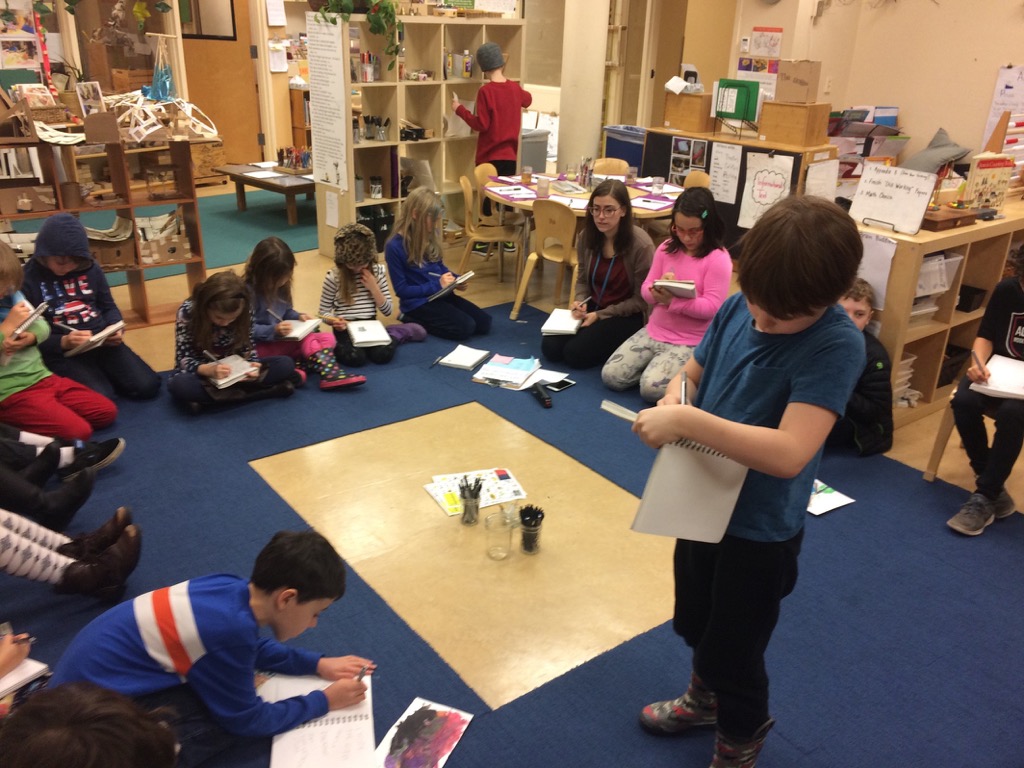 After they wrote quietly in their Thinking Journals, we all shared around the circle our many hopes for change. These hopes included, “I hope he plans to make this place in peace,” “I hope he doesn’t start a war,” “Or build a wall between us and Mexico.” They asked for Trump to, “Please stop starvation,” and “Help the homeless,” and for him to “Create better education for everyone,” and “Make the culture a better place.”
After they wrote quietly in their Thinking Journals, we all shared around the circle our many hopes for change. These hopes included, “I hope he plans to make this place in peace,” “I hope he doesn’t start a war,” “Or build a wall between us and Mexico.” They asked for Trump to, “Please stop starvation,” and “Help the homeless,” and for him to “Create better education for everyone,” and “Make the culture a better place.”
I told them that, like the elected president this year and in the beginning of other presidental terms in our country’s past, there is a tradition to set intentions for the first 100 days. I then I asked them: What might WE want to accomplish together? What do we want to improve on as a community to make it a better place for all?
Individual children went to different materials to consider this provocation for themselves. Here is a cross-section of the range of intentions for our 100 Days Plan:
Making stronger bridges with friends.
 Finish our white house.
Finish our white house.
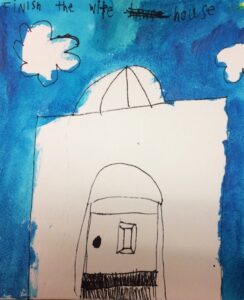
To make our room more organized.
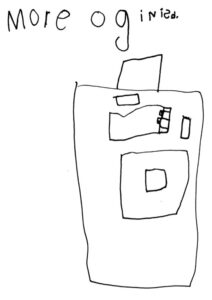 To have balance in our community.
To have balance in our community.
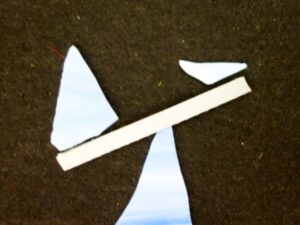
During our reflection meeting afterward children shared:
Mead: I have an idea that we do everyone’s idea AND everyone can be happy.
Zion: I think we can do all those things if we use all our gifts. It will make Magnolia a better place.
Teacher: Why is it important to think how these things might work for everyone? Why is it important to think about a “Better place for all”?
Iris: It’s important to think about it… because you are not the only one …we would have to agree.
Caylan: We want the community to be greeted.
Aleeza: We want the whole community to feel like a community. A community is a group of people, of friends, who work together.
Lois: I want everyone in the whole school, even in the preschool’s voices to be heard, and everyone’s opinion to be shared.
Teacher: Is that possible to accomplish in 100 days?
Many children: Yes! Probably less.
I thought to myself, this is what it sounds like when children start to see their own gifts and are eager to see the gifts in others. Growing in awareness that they can’t be their “best” without other people’s “best.” That’s the kind of practice that this world needs.
This conversation about our 100 Day Plan involved them in the process of connecting what’s going on in the world to something that they actually have control over; something that they were growing connection to; an investment in their community.
At a time when some of us are feeling powerless, these children have the chance to take action in meaningful ways to them and construct a system. They have the power over what kind of community they want to be together.
How are you supporting agency and democracy in your communities in a way that responds to children’s feelings about the current political climate?

As I witness the students’ exploration of these values and see them seriously reflecting on the gifts that they each bring to the community, it is evident that this approach is such a valuable method of reflecting on how we, individually, can contribute to the community (and world) as a whole. It can be so overwhelming to try to process, much less address, all the ills of the world, but focusing on utilizing our own gifts is a very tangible action we can all commit. From this reflection we then set our intentions and plan our actions. Throughout this process, within my own home, we have been emphasizing the necessity to think critically about the challenges we face and the policies we oppose. If we can avoid demonizing and name-calling individuals, and instead analyze the value, or lack of value, for political decisions, we have a headstart in recognizing how to match our gifts to real-world solutions.
Emily, it is such a balance and timing consideration…
When do we bring certain things back to them to light or ignite other thinking?
What do we bring? What filter do we look through?
Why do we bring it?
So many factors, dependent on so many considerations within each new group. This year, I decided not to wait on gifts, but to feel out when it felt like they were first showing and being valued and recognized in others. I knew that the 100 days plan would bring us to the platform of, well, in short words, “How will we get all these hopes done?” I knew that gifts, or at least their self-identified, first-drafts of gifts would be explored, under the umbrella of the study of ourselves. I was curious, do the children think we have what it takes to get these things done? What are those things, those attributes of a community? …a culture?
What do they identify as their gifts now?
What will they see as their gifts as we consider completing these goals?
So much to look forward to!
-Lauren
There are so many connections to this work and the work with interdependence these students will continue to dig into in Opal 3 and beyond – so exciting! It also makes me think of the power of hope – how hope helps us when we feel powerless or out of control, hope helps us take the steps we can in our own here and now.